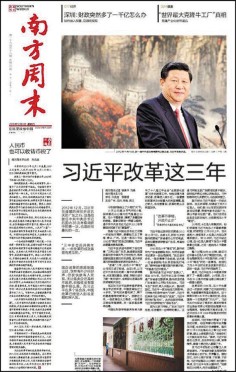
Chinese media evokes image of Titanic to endorse reformist Xi Jinping keeping nation afloat
Mainland media evokes image of Titanic to help endorse president's reform agenda, bolster his image and justify his concentration of power
President Xi Jinping is personally in charge of all major political initiatives in China lest the nation sinks like the Titanic, according to a article that is seen as a move to endorse his reform agenda, bolster his image and to justify his concentration of power.
Shortly after Xi took power as Communist Party chief three years ago, he paid a visit to Shenzhen in what was widely seen as a symbolic move to assert his determination for further economic reform.
State media at the time quoted him as saying there would be "no stop in reform and no stop in opening up" and that "reform and opening up was a great awakening in the party's history".

At a key party policy meeting in 2013, the third plenum, Xi pledged to give market competition a "decisive role" in the economy, step up the anti-corruption drive, strengthen judicial independence and set up two powerful party organs - headed by Xi himself - to deepen reforms and to formulate a national security strategy. The communiqué stopped short of mentioning any political reform move.
Political observers say the party is facing many obstacles to Xi's economic and military reform agenda.
The challenges come from breaking the hold of vested interests, correcting the relationship between political power and the market economy and narrowing the wealth gap, political observers have said.
The article published on Thursday emphasised Xi's image as the authoritative head of his reform drive.
It quoted Xi as saying in the summer of 2013 that to brave the challenges of reform, one must be familiar with deep water.
"[We] would encounter more and more reefs, undercurrent and whirlpools. To push reform, you must be familiar with water," he was quoted as saying.
"Our country is a big one, we cannot make mistakes in fundamental issues," Xi said. "If the Titanic is going to sink, it will sink."
The article also tried to justify Xi's role as the head of various central leading groups, including the reform commission and the national security commission - moves that had been criticised as giving the party chief too much power.
"Judging from the outcome, we can see that it was conducive towards reforms," the article quoted Zhang Zhuoyuan, an economist who helped draft the third plenum communiqué, as saying.
"Without the central party, especially the determination of the top leaders, many important reform measures would have been difficult to launch."
also mentioned Xi's "unprecedented" military and army reform efforts and hailed his high-profile diplomatic missions abroad.
Many rank-and-file political officers are expected to lose their jobs in the reform of the People's Liberation Army.
The party's grip on the military's political ideology will also be tightened with the setting up of a discipline commission. These moves are expected to be met with resistance, analysts have said.
Chen Daoyin , an associate professor at Shanghai University of Political Science and Law, said that the authorities had chosen , which enjoys popular readership, to send a message because Xi was seeking wider support and endorsement from ordinary people for his reform agenda, which has been met with resistance.
"It is to endorse Xi and to shape his image as the chief architect of reform … and to lay the foundation for his legitimacy," he said.
"It is saying that Xi's move to concentrate his power has been a correct decision because you need an authoritative figure like Deng Xiaoping to push [reforms]."

